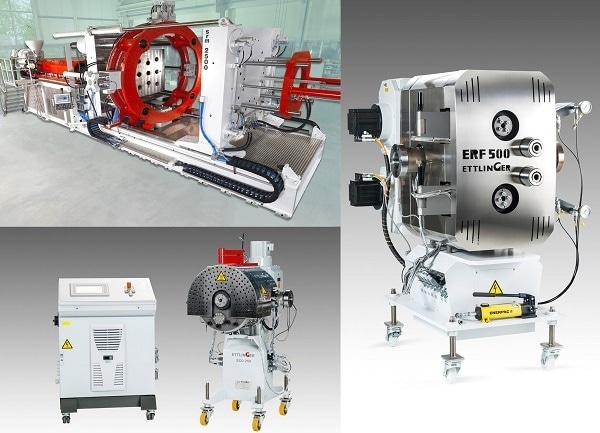Sep 8 2016
Ettlinger Kunststoffmaschinen GmbH will be using this year's K 2016 trade fair to showcase an enhanced range of high-efficiency melt filters, and itself as a manufacturer of injection molding machines designed to produce very large moldings.
 top left: a srm 2500 injection molding machine from Ettlinger with a shot volume of 120 liters,
equipped to produce large wastewater manholes; right: the ERF 500 melt filter for heavily
contaminated melts, with throughputs of up to 6,000 kg/h; bottom left: the ECO 250 melt filter
for film extrusion and PET processing
equipped to produce large wastewater manholes; right: the ERF 500 melt filter for heavily
contaminated melts, with throughputs of up to 6,000 kg/h; bottom left: the ECO 250 melt filter
for film extrusion and PET processing
top left: a srm 2500 injection molding machine from Ettlinger with a shot volume of 120 liters,
equipped to produce large wastewater manholes; right: the ERF 500 melt filter for heavily
contaminated melts, with throughputs of up to 6,000 kg/h; bottom left: the ECO 250 melt filter
for film extrusion and PET processing
equipped to produce large wastewater manholes; right: the ERF 500 melt filter for heavily
contaminated melts, with throughputs of up to 6,000 kg/h; bottom left: the ECO 250 melt filter
for film extrusion and PET processing
- Ettlinger's srm series of injection molding machines is suitable for shot volumes of up to 160,000 cm³. The defining feature of these machines is the structural separation of the melt processing and the injection unit. This makes them far more energy-efficient than conventional machines.
- With regard to the melt filters, the ERF series, which is also suitable for heavily contaminated plastics, is now capable of handling even higher throughputs, while the ECO models are optimized for filtering PET and PE in film and foil lines as well as lowviscosity thermoplastics and polyamide.
Maximum filtration, minimal melt loss
The patented, continuously operating ERF and ECO melt filters can be incorporated into almost any extrusion line. At the heart of both filter types is a rotating filter drum with conical perforations through which the contaminated melt flows from the outside to the inside. A scraper continuously removes the contaminants that are held back at the surface of the drum and feeds them to an exit screw. This enables the filter to be used continuously and fully automatically over a period of weeks and months without having to replace the screen. The advantages of this design are the constant melt pressure, extremely low melt losses, good mixing and homogenizing of the melts and short contaminant residence times on the filter surface.
- ERF filters, for throughputs of up to 6,000 kg/h, are suitable for separating contaminants such as paper, aluminum, wood, silicones or high-viscosity plastics from heavily contaminated polyolefins and polystyrenes. Improvements made to the flow channels now lead to lower differential pressures, which in turn can facilitate increases in throughput rates and gains in productivity of up to 15 %. ERF melt filters are chiefly used in the extrusion of PP, HDPE, LDPE, PS and certain engineering thermoplastics such as packaging films, refrigerator and electronic waste, yoghurt cups (web scrap), car bumpers, bottlecaps or pipes and are processed into granulates, sheets, films or profiles.
- ECO melt filters, designed for maximum throughputs of 1,800 kg/h (ECO 200) and more than 3,000 kg/h (ECO 250), respectively, have been optimized by Ettlinger specifically to support sophisticated extrusion processes such as the manufacture of films, sheets and other semi-finished products. They are ideal for filtering polyolefins, PET and PA as well as recycled materials containing up to 1.5% contaminants.
Around two-thirds of the ECO melt filters installed to date are used to process PET. 80% of these are being used in the manufacture of thermoforming sheets and packaging tapes made from bottle regrind, the rest in the processing of fines gained from grinding PET bottles, which are primarily reconstituted into high-quality PET pellets. The remaining third are used in the processing of polyolefins. With a share of around 60%, the main application area of these filters is – apart from compounding – in the manufacture of construction sheeting and thermoforming sheets made of virgin material. Here, they help fulfill high demands regarding the surface quality of the sheeting by greatly reducing the number of specks.
Injection molding machines that deliver 160,000 cm³ in one shot
The srm series of large, two-stage injection molding machines covers the clamping force range from 2,000 to 30,000 kN and shot volumes from 5,000 to 160,000 cm³. Designed for making moldings that weigh upward of 1,000 g and have wall thicknesses of 2 mm and more, typical applications include the production of plastic pallets, fittings, manhole and wastewater systems from virgin, reclaimed or recycled material. In all versions of the series, a relatively small extrusion unit plasticizes the material while a separate plunger unit injects the melt into the mold. This enables large shot volumes to be processed with a high melt quality, but using lower clamping forces in the clamping unit. The small size of the units means that they can be equipped with correspondingly smaller drives that consume up to 60% less energy than similar, conventional injection molding machines from competitors. What's more, the combination of a compact plasticizing unit and a short clamping unit means that the footprint of the machinery, and therefore the amount of production floor space required, is significantly smaller.
When it comes to transforming highly contaminated melts into large, heavy and yet highquality moldings, combining both Ettlinger products – that is, integrating an ERF melt filter downstream of the plasticizing unit and another upstream of the injection unit of a srm machine – results in a solution that offers both high productivity and cost efficiency.